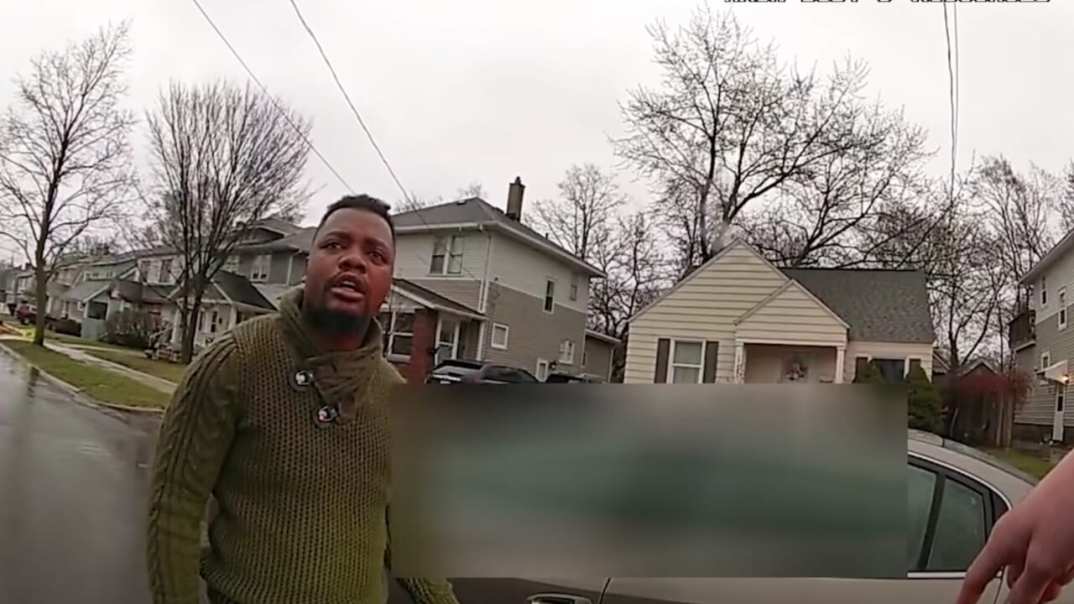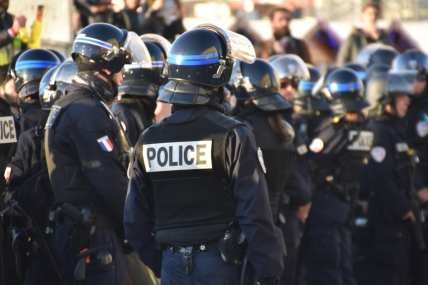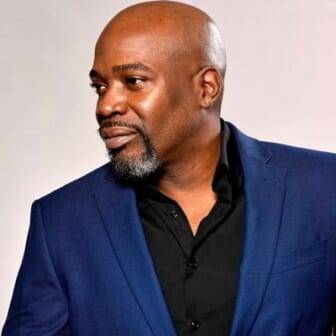How to survive America: A requiem for Patrick Lyoya
OPINION: After viewing the video of the officer-involved shooting of Patrick Lyoya, we responded to the people who suggest he should have complied by asking: What does it take for a Black person to survive an encounter with a police officer?

On Wednesday, authorities released footage of a confrontation that ended with an expected conclusion–a Grand Rapids, Mich., police officer shooting 26-year-old Patrick Lyoya in the head at point-blank range.
Then, everyone began singing.
You know the song. Whenever a badge-wearing, big-game hunter manages to bag another Black body, there is a melancholy melody that announces the state-sanctioned execution. The police department’s silence is the prelude until it is broken by the parents’ wail. The protesters march in, hoping someone, anyone will hear the outrage in their voices. The drums beat. The people chant. They are always loud, and they are always unheard. Always.
But, this is not the only song.

The false fantasy of funding the police
The symphony of dirges and demonstrations are usually accompanied by the Caucasian Mass Choir singing the traditional elegy that follows the spilling of Black blood. The lyrics to the 200-year-old whitesplaining hymnal “It’s Probably Their Fault” begins with the benefit of the doubt being extended to the “unidentified officer.” In the second verse, the police ask us to wait until they get all the facts. Before the third verse talks about a thorough “investigation,” they belt out the chorus, which is always the same.
“They shouldn’t have resisted.”
“Why can’t they just follow directions?”
“If only they had…”
The tune has been played since this country created its system of policing as a way to control Black bodies in the most violent way possible. It has been remixed as a theme song for slave catchers; a lullaby for lynchings and a psalm for segregationists. When the band plays the first refrain, everyone stands at attention and places their hands over their hearts. Meanwhile, we kneel, knowing that this is America’s true national anthem.
Instead of examining the protests or joining Patrick Lyoya’s death ritual, we wanted to talk about the song, so we decided to verify the contents of this traditional wypipo spiritual. What could he have done better? We collected the data with specific examples to detail how you, too, can survive a police interaction.
1. Drive carefully.
Even if you have your license, insurance and your car is in working order, you will still get stopped because—according to the Stanford Open Policing Project, the largest analysis of police stop data in history—Black drivers are more likely to be pulled over by cops in every state in the country, even though white people are more likely to be carrying a weapon or contraband. Policing is a very risky job, so it’s normal for them to fear for their lives during a traffic stop…
Except it’s not. Statistically speaking, a police officer is more likely to die from a lightning strike, a snakebite or an insurrection than during a traffic stop. In fact, the chance of a police officer being killed while detaining a vehicle is less than 1 in 3.6 million, the New York Times reports. To be fair, last year was one of the deadliest years for police officers in recent history, according to the Officer Down Memorial Page. Since the George Floyd protests, police have been targeted at an alarming rate––not by motorists…
By COVID-19.
2. Drive as much as you want.
It’s not the driving that will get you killed. In states that collect data for pedestrian stops, police are more likely to stop and search Black people when they are walking and on bicycles. Incredibly, there are multiple years where the NYPD stopped more young Black men between the ages of 14 and 24 than there were in the entire city of New York.
Plus, Amadou Diallo was simply standing outside his home when police shot him 41 times. When Chicago Police Detective Dante Servin shot Rekia Boyd, she was just walking by. Tamir Rice wasn’t even old enough to drive. Perhaps that was Lyoya’s first mistake:
Being outside.
3. Do not run.
The deaths of Freddie Gray and Walter Scott show that police interpret running as a form of aggression. So, according to internet-flavored white people, Lyoya shouldn’t have tried to run from the officer who killed him.
Apparently, these people have never heard of Alton Sterling who, like Lyoya, was pinned to the ground when a Baton Rouge, La., police officer killed him. Apparently, they have never heard of Atatiana Jefferson, who was in her home and never had a chance to run. Apparently, it doesn’t matter that the officer actually caught Lyoya and then he killed him.
4. Run away.
I know what I just said but George Floyd did not run. Breonna Taylor had nowhere to run. Natasha McKenna was bound to a restraint chair with a hood over her face when she was tased to death. She couldn’t run anyway; she was in jail.
Since 2015, two out of every five Black people shot and killed by police were fleeing when they were killed, according to the Washington Post’s “Fatal Force” database. By comparison, less than a third of whites killed by police (29.1 percent) were fleeing the scene.
5. Stop resisting.
Even though we know police officers are trained to yell that phrase in the police academy, our Caucasian advisers tell us it’s generally a good idea to do what the guy with the gun tells you to do.
This only matters if you’re Black.
White people can yell, scream and threaten cops but, according to a study by the Journal of the Society for Social Work and Research, Black males who earn less than $50,000 are more likely to be pushed, grabbed or handcuffed. White women can just break down and cry but Black women who earn high incomes are more likely to be shouted at, cursed at or threatened with arrest.
These statistics don’t include the 1,575 people with mental illness who were killed by police since 2015.
6. Do not comply.
You know white people always do what the police say. Perhaps Black folks wouldn’t get killed so often if we just calmed down and did what the guy with the gun in our face is telling us to do.
Tell it to Philando Castile. Tell it to 17-year-old Donta Dawson, who put his hands up as instructed, only to be shot by officers Christopher DiPasquale and Kirk Dodd for “sudden movements.” Tell it to Levar Jones, who was shot for reaching for his driver’s license after South Carolina State Trooper Sean Groubert asked him for his driver’s license.
7. Do not have a weapon.
A Black person who is unarmed is three times more likely to be shot than a white person with a weapon. And I know you’re thinking that Lyoya was unarmed but by reportedly grabbing the cop’s taser, he was technically armed.
Police in Charleston, S.C., initially didn’t question Michael Slager’s false police report when he said he shot and killed Walter Scott after Scott grabbed Slager’s taser. Turns out, Scott did no such thing. Police allowed Kyle Rittenhouse to prance around with a long gun during a protest over Jacob Blake, who was shot in the back for putting a knife in his car.
8. Do not be unarmed.
While the internet isn’t big enough to list the names of all the unarmed Black people killed by cops, you should also be aware that, to a police officer, anything is a weapon.
Tamir Rice’s toy gun was a weapon. Stephon Clark’s cell phone was a weapon. So was Jason Harrison’s screwdriver, Andrew Brown Jr’s car, Sandra Bland’s attitude and Korryn Gaines’ son.
Or maybe Blackness is a weapon.
The Golden Rule
Ultimately, your actions don’t matter. There is nothing you can do that will stop the cops from transforming an alive Black body into a corpse. The data, research and evidence prove it. However, if you want to survive an encounter with a police officer, you must remember the one all-important rule:
Do not be Black.
I’m sure there’s a song about it.

Michael Harriot is a writer, cultural critic and championship-level Spades player. His book, Black AF History: The Unwhitewashed Story of America, will be released in 2022.
TheGrio is FREE on your TV via Apple TV, Amazon Fire, Roku, and Android TV. Please download theGrio mobile apps today!
